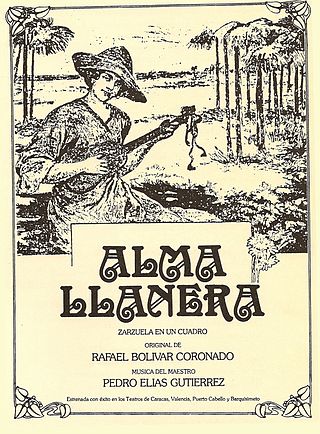
Several styles of the traditional music of Venezuela, such as salsa and merengue, are common to its Caribbean neighbors. Perhaps the most typical Venezuelan music is joropo, a rural form which originated in the llanos, or plains.

The joropo, better known as Música Llanera, is a musical style resembling the fandango, and an accompanying dance. It originated in Venezuela and it has African, European and Native South American influences. There are different joropo variants: tuyero, oriental, and llanero. It is a fundamental genre of Colombian and Venezuelan música criolla. It is also the most popular "folk rhythm": the well-known song "Alma Llanera" is a joropo, considered the unofficial national anthem of Venezuela.
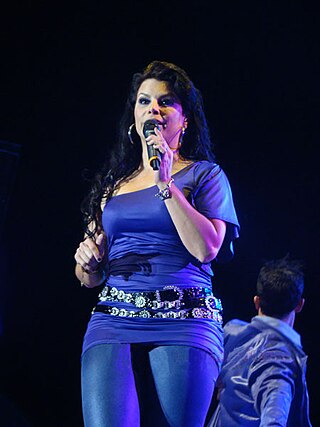
Olga Teresa Tañón Ortiz is a Puerto Rican singer-songwriter. Over the course of her career, she has earned two Grammy Awards, three Latin Grammy Awards, and 29 Premio Lo Nuestro Awards.

Guillermo Dávila is a Venezuelan actor and singer who has acted in many telenovelas.

Vicente Carattini was a singer and composer of Puerto Rican Christmas-related songs.

Simón Narciso Díaz Márquez, also known as tío Simón, was a Venezuelan singer, actor, TV host, comedian, and Grammy Award-winning composer of Venezuelan music. Some of his most popular songs include Caballo viejo, Tonada de luna llena and La vaca Mariposa.
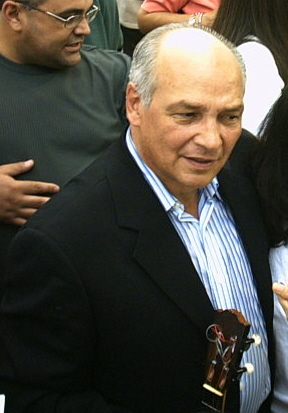
Hernan José Gamboa Alexis was a Venezuelan musician, composer and singer. He was a member of the Venezuelan fold music group Serenata Guayanesa, and later released separate albums.
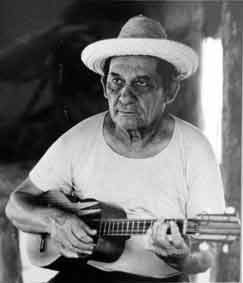
Luis Mariano Rivera (1906-2002) was a Venezuelan singer, composer, poet, and dramatist.

Enrique Hidalgo is one of the most influential popular musicians, children's poets and authors from Venezuela. Hidalgo's work includes more than 500 songs, notably "Barcelonesa”, "Presagio", "Ladron de tu amor", '“La Carta” among others, more than eight children's educational books, and many musical productions written and arranged by himself. Enrique Hidalgo is an accomplished musician and multi-instrumentalist. His compositions have been interpreted by artists such as Oscar D'Leon, Gualberto Ibarreto, Quinto Criollo, Barbarito Diez, Aida Cuevas, Serenata Guayanesa, Fania Allstars, Roberto Roena, Urbanda, Los Hidalgo, Hector Cabrera, Arabella, Juan Carlos Salazar, Edward Mena, among many others. Hidalgo is currently working in different cultural and musical projects in Florida.
The malagueña is a genre of folk music from eastern Venezuela, most notably from the island of Margarita. It is characterized by a solo vocal performance and typical accompaniment of a mandolin, a cuatro and a guitar, with a rhythm in 3/4 time.
Manuel de los Santos Pastor, also known as El Agujetas or el El Agujeta, was a flamenco singer.

The cuatro of Venezuela has four single nylon strings, tuned (ad'f#'b). It is similar in shape and tuning to the ukulele, but their character and playing technique are vastly different. It is tuned in a similar fashion to the traditional D tuning of the ukulele, but the A and B are an octave lower. Consequently, the same fingering can be used to shape the chords, but it produces a different inversion of each chord. A cuatro player is called a cuatrista.
Christian Nieves is a Puerto Rican cuatro player. Nieves is mostly known for having been a performer in the American reality television series Q'Viva!: The Chosen, where his performance became famous for bringing singer Jennifer Lopez to tears who considered the melody very emotional.
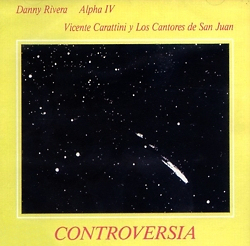
Controversia is an album by Danny Rivera, Vicente Carattini y Los Cantores de San Juan and Alpha IV. This album was Danny Rivera's first Puerto-Rican-Christmas-Music album. The title song "Controversia" (Controversy) is about an argument between Danny and Vicente in which Vicente accuses Danny of stealing Christmas gigs from him by becoming a new Christmas-music singer. At the end of the song, vocalist Alma Galarza comes in to break up the "fight" and at the end they both make peace. In real life, however, Danny did steal something from Vicente. For his next album Ofrenda he wanted vocalist Alma Galaza to be a special guest vocalist, but only if she quit Vicente and his group. Alma went with Danny with whom she recorded several albums and toured for several years.
Henry Martínez is a Venezuelan musician and songwriter. He was born in Maracay, the capital city of Aragua state.
Andrés Jiménez Hernández, popularly known as "El Jíbaro", is a composer and singer of traditional Puerto Rican folk music and is that music genre's best known contemporary trovador linked to the Neofolkloric movement of the Nueva Canción.
The OTI Festival 1975 was the fourth edition of the annual OTI Festival. It took place in San Juan, Puerto Rico, following the country's victory at the 1974 contest with the song "Hoy canto por cantar" by Nydia Caro. Organised by the Organización de Televisión Iberoamericana (OTI) and host broadcaster Telemundo, the contest was held at Telemundo television studios on Saturday 15 November 1975 and was hosted by Marisol Malaret and Eddie Miró.
This is the list of members elected in the 2017 Constituent National Assembly of Venezuela following the 30 July 2017 elections. The first session of the assembly began on 4 August 2017 in the Oval Room of the Palacio Federal Legislativo. The Democratic Unity Roundtable—the opposition to the incumbent ruling party—also boycotted the election claiming that the Constituent Assembly was "a trick to keep [the incumbent ruling party] in power." Since the opposition did not participate in the election, the incumbent Great Patriotic Pole, dominated by the United Socialist Party of Venezuela, won almost all seats in the assembly by default.
Manuela Saenz is a historical biography movie directed by Diego Risquez, with a script by Leonardo Padron. It stars Beatriz Valdés in the title role, alongside Mariano Álvarez as the liberator Simón Bolívar. Other main cast members include Erich Wildpret, Juan Carlos Alarcón, Orlando Urdaneta, Manuel Salazar, Alejo Felipe, and Juan Manuel Montesinos.










